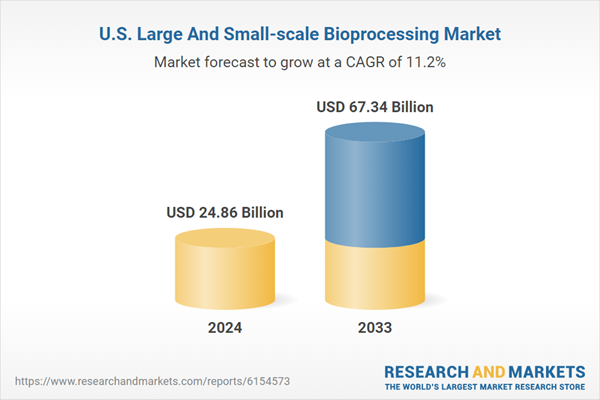Biopharmaceutical companies are increasingly investing in flexible manufacturing solutions, such as single-use technologies and modular bioprocessing systems, to accelerate development timelines and reduce costs.
Growing Adoption of Single-Use Technologies in U.S. Bioprocessing
The increasing implementation of single-use technology (SUT) is transforming the U.S. large- and small-scale bioprocessing market, enabling greater flexibility, operational efficiency, and cost-effectiveness in biologics manufacturing. Single-use systems, including bioreactors, bags, filters, connectors, and tubing, are increasingly favored over traditional stainless-steel setups, particularly for small-batch and multiproduct facilities. Their ability to reduce cleaning validation, lower the risk of cross-contamination, and minimize turnaround times makes them highly suitable for modern, fast-paced bioproduction environments. As the demand for personalized medicine and modular manufacturing grows, SUT adoption is accelerating across both clinical and commercial stages.Biopharmaceutical companies and CDMOs are leveraging single-use technologies to streamline scale-up processes, shorten development timelines, and meet the increasing need for agile production. These systems are particularly valuable in early-stage manufacturing, where flexibility and speed are critical. The growth of cell and gene therapies, which often require small, high-value batches, is further driving the shift toward SUT-based infrastructure. Additionally, the rise of multiproduct facilities demands rapid changeovers, which are more efficiently supported by single-use components than traditional clean-in-place systems.
Manufacturers of bioprocessing equipment are continuously innovating within the SUT space to enhance performance, durability, and compatibility with complex biologics. Developments such as gamma-stable polymers, automation-integrated systems, and scalable single-use platforms are expanding the applicability of SUTs beyond early-stage production to include commercial-scale operations. Key industry players are also investing in hybrid bioprocessing models, combining single-use and stainless-steel systems, to balance cost, scale, and compliance. This trend reflects the evolving needs of manufacturers to customize production environments based on batch size, product type, and regulatory requirements.
Looking ahead, the growth trajectory of SUT in the U.S. bioprocessing market is supported by strong regulatory acceptance, increasing investment in flexible manufacturing facilities, and the expanding pipeline of biologics and advanced therapies. The technology’s ability to reduce capital expenditure, operational risk, and production downtime positions it as a core enabler of next-generation biomanufacturing. As the industry continues to prioritize speed, safety, and scalability, single-use systems are expected to play an even more central role in shaping the future of bioprocessing in the U.S.
U.S. Large And Small-Scale Bioprocessing Market Report Segmentation
This report forecasts revenue growth and provides an analysis of the latest trends in each of the sub-segments from 2021 to 2033. For this report, the analyst has segmented the U.S. large and small-scale bioprocessing market based on scale, workflow, product, application, use-type, and mode:Scale Outlook (Revenue, USD Million, 2021 - 2033)
- Industrial Scale (Over 50,000 Liter)
- Small Scale (Less Than 50,000 Liter)
Workflow Outlook (Revenue, USD Million, 2021 - 2033)
- Downstream Processing
- Fermentation
- Upstream Processing
Product Outlook (Revenue, USD Million, 2021 - 2033)
- Bioreactors/Fermenters
- Cell Culture Products
- Filtration Assemblies
- Bioreactors Accessories
- Bags & Containers
- Others
Application Outlook (Revenue, USD Million, 2021 - 2033)
- Biopharmaceuticals
- Speciality Industrial Chemicals
- Environmental Aids
Use-Type Outlook (Revenue, USD Million, 2021 - 2033)
- Multi-Use
- Single-Use
Mode Outlook (Revenue, USD Million, 2021 - 2033)
- In-House
- Outsourced
Why should you buy this report?
- Comprehensive Market Analysis: Gain detailed insights into the global market across major regions and segments.
- Competitive Landscape: Explore the market presence of key players worldwide.
- Future Trends: Discover the pivotal trends and drivers shaping the future of the global market.
- Actionable Recommendations: Utilize insights to uncover new revenue streams and guide strategic business decisions.
This report addresses:
- Market intelligence to enable effective decision-making
- Market estimates and forecasts from 2018 to 2030
- Growth opportunities and trend analyses
- Segment and regional revenue forecasts for market assessment
- Competition strategy and market share analysis
- Product innovation listing for you to stay ahead of the curve
- COVID-19's impact and how to sustain in these fast-evolving markets
This product will be delivered within 2 business days.
Table of Contents
Companies Mentioned
- Merck KGaA (MilliporeSigma)
- Thermo Fisher Scientific, Inc.
- Danaher (Cytiva)
- Corning Inc.
- Sartorius AG
- Lonza
- Eppendorf AG
- Getinge AB
- PBS Biotech, Inc.
- Meissner Filtration Products, Inc.
- Entegris
- Saint-Gobain
- Repligen Corporation
- Avantor, Inc.
- Distek, Inc.
- F. Hoffmann-La Roche Ltd
- Bio-Synthesis, Inc.
Table Information
| Report Attribute | Details |
|---|---|
| No. of Pages | 120 |
| Published | July 2025 |
| Forecast Period | 2024 - 2033 |
| Estimated Market Value ( USD | $ 24.86 Billion |
| Forecasted Market Value ( USD | $ 67.34 Billion |
| Compound Annual Growth Rate | 11.2% |
| Regions Covered | United States |
| No. of Companies Mentioned | 17 |









